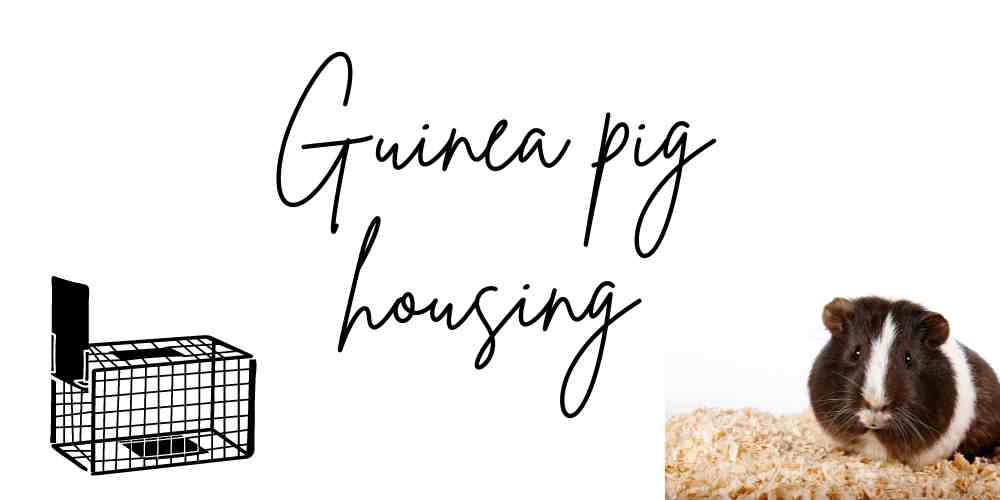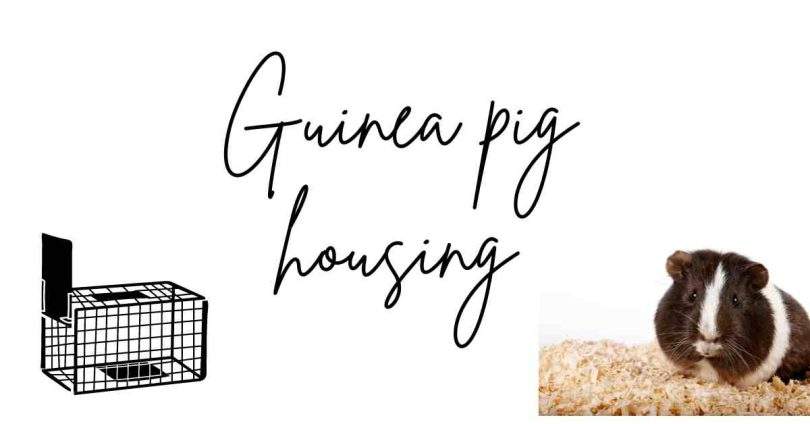
Although guinea pigs are often marketed as being able to live in small spaces, most pet stores sell too small guinea pig cages. These cages also often have wire grid floors, which can harm guinea pigs. Ideally, guinea pigs should have as much living space as possible. The recommended guinea pig cage sizes are listed below. Adhering to these standards will improve the health and happiness of your guinea pigs.
Ideal cage size for guinea pigs
Embed from Getty ImagesThe suggestions below are intended to provide direction to help you determine how much area your guinea pig needs. In addition, the enclosure should have an opening on one side to allow for sufficient air circulation. The cage must also be secure enough that your guinea pig cannot escape. Your guinea pig cage should also be free from sharp corners and other possible hazards. Finally, the size should allow for regular guinea pig activity.
- One guinea pig: 5.7 square feet, or about 39″ x 21″, is the minimum advised, but bigger is more suitable. (Remember that guinea pigs are very social creatures, so it is best to have at least two of them that get along well together.)
- Two guinea pigs: 7.3 square feet (minimum), but at least 10.5 square feet (46″ x 23″) is preferred.
- Three guinea pigs: 10.5 square feet (minimum), but at most little, 13 square feet (50″ x 30″) is better.
- Four guinea pigs: 13 square feet (minimum), but at least 30″ x 62″ is more appropriate.
Benefits of a larger cage for your guinea pig

- Guinea pigs need large enclosures to stay healthy and happy. Small spaces can lead to boredom and depression.
- Larger enclosures allow guinea pigs to exercise on schedule, get along better with other guinea pigs, and keep their living area clean.
- Providing your guinea pig with a large enclosure is essential for their physical and mental health. Conversely, Guinea pigs housed in small enclosures are likelier to suffer health problems such as heart disease, diabetes, or bumblefoot.
- Giving them enough space to exercise whenever they want prevents these issues and makes it easier for them to get along with other guinea pigs.
- A larger enclosure is also easier to keep clean.
Guinea pig Cage Accessories

The accessories you will need to set up a home for your guinea pig include a water bottle, bowl for pellets, hiding place, cage hayrack & hammock. In addition, you will need the following things to create a comfortable home for your guinea pig: a water bottle, a bowl for pellets, hiding place.
Cleaning Guinea pig cage
Frequent cage cleaning is vital for guinea pig health. If you don’t clean your guinea pig cage regularly, urine can break down and release ammonia gas, harming your pet’s respiratory system. Additionally, guinea pigs can develop urinary tract infections because of harmful bacteria growth. Therefore, be sure to clean the cage daily! Poor hygiene in the cage is a common cause of disease problems for guinea pigs. Problems such as runny eyes and nose due to irritants from urine-soaked bedding material or sores on the pads due to contact with damp and irritating bedding or too flat, hard surfaces.
To clean your guinea pig cage:
- Remove guinea pigs from the cage and dispose of bedding.
- Rinse the cage with warm water and soap, scrubbing the floor. If there are calcium deposits, pour vinegar on them and let them soak for several minutes.
- Rinse thoroughly with clean water to remove all soap/vinegar/acids, then dry the cage thoroughly.
Where to Place a Guinea Pig Cage
Embed from Getty ImagesTemperature: The best temperature range for guinea pigs is about 65-75 degrees Fahrenheit. The housing for guinea pigs should be situated away from very strong heat sources, such as direct sunlight, wood stoves, fireplaces, and heating vents. Guinea pigs cannot sweat when they get too warm and are especially vulnerable to heat stroke.
Do not place your guinea pig cage in a location that is not heated, has a lot of drafts, or is otherwise cold. Instead, find a spot for their cage that is comfortable and without any strong winds. Guinea pigs do not thrive in very humid areas. The moist conditions are ideal for mold growth in their hay and bedding, which can also make your guinea pig sick.
Noise: Guinea pigs have highly acute hearing and should not be kept in cages near sound systems, televisions, as well as other loud noises.
Tranquility level: A sitting room or living room works great, but ensure your pigs have a quiet area if they require it.
For cleanliness reasons, leaving your guinea pig’s cage out of your kitchen or any other area where food is handled is best. Also, ensure your guinea pig’s cage is out of reach of other pets who may view them as prey.
If you have young children, keeping the cage in an area where you can monitor and supervise their interactions with the piggy is best.
Can you keep guinea pigs outside?
An outdoor hutch used to be seen as a suitable housing option for guinea pigs. However, keeping them outside means they miss out on regular contact with family members. Therefore, you should only do outdoor exercise for guinea pigs under the supervision and for short amounts of time in good weather conditions.
Can Guinea Pigs Live Alone
It is essential that guinea pigs have companions and are not kept alone. It is advisable to buy them in pairs so that they are content and lively. As social creatures, guinea pigs do best when living with others of their kind. Males and females can live together if the male has been neutered. However, it is common for newly introduced males to fight if they are placed together as adults or with a female present. Older, more dominant piggies may bite the ears or hair of more submissive ones.
Conclusion:
The cage in which a guinea pig is kept can be made from different materials. Depending on the owner’s preference and budget, stainless steel, plastic, and glass are among the most popular choices. However, it is essential to remember that guinea pigs are sensitive animals and thrive best in environments that are quiet and free from direct sunlight or cold, humid areas. You should also clean the cage daily to prevent disease problems.






